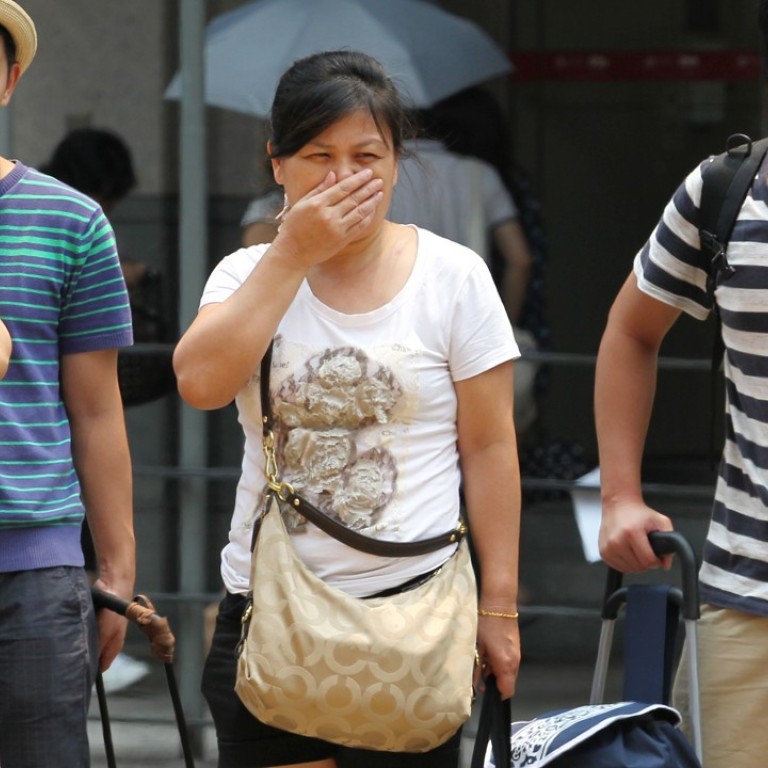
Letters to the Editor, August 24, 2017
Health chiefs avoiding issue of air pollution
The report, “West side of Hong Kong and the poor most at risk from city’s dirty roadside air, study finds” (July 14) revealed how public health is still not sufficiently protected from the threat of serious roadside air pollution. It is surprising to see how the Food and Health Bureau looks into the matter. Its spokeswoman said air quality was an environmental issue and declined to comment.
Is air quality solely an environmental issue, and not a public health one? The Department of Health launched a strategic framework in 2008, “Promoting Health in Hong Kong: A Strategic Framework for Prevention and Control of Non-communicable diseases” (NCDs). It highlights air pollution as one of the most important environmental risks that leads to the onset and development of such diseases. The bureau should be engaged in solving air pollution as a public health crisis.
Some Hong Kong statistics show how serious the problem is. Despite government efforts to combat tobacco and promote healthy lifestyles, deaths caused by air pollution-related respiratory and circulatory diseases have risen to more than 20,000 in 2015.
As the second most common killer after cancer, this figure represents up to 40 per cent of annual registered deaths.
There is an increasing understanding that air pollution is regarded as the tobacco of the 21st century. Just as there has been a growing awareness over the past 50 years about the health threat posed by smoking, more evidence is emerging showing that air pollution does more harm to people than was initially thought to be the case. In terms of public health strategies, there is a growing consensus that controlling environmental determinants and reducing behavioural risk factors are equally important to maximise the impact of NCD prevention.
The World Health Organisation’s “Global Action Plan for the Prevention and Control of NCDs 2013-2020” set out nine targets, one of which is a 25 per cent relative reduction in the overall mortality from cardiovascular diseases, cancer, diabetes, or chronic respiratory diseases, to reduce premature mortality from NCDs. Every day, there are five premature deaths caused by air pollution in Hong Kong.
It is time for the Food and Health Bureau to take seriously the adverse health impact caused by air pollution, and devise action plans and deliverables to prevent and control NCDs caused by air pollution.
Loong Tsz-wai, community relations manager, Clean Air Network
Subsidise small bookshops and help creativity
The fact that Hong Kong has slid down the global competitiveness index has been a cause for concern.
One way to try to redress that balance is to encourage greater creativity. It can only help us if we develop the creative sector and this quality should be nurtured in our schools.
One way to do that is to get more youngsters reading on a regular basis.
Reading a lot, and widely, can help youngsters think in a more independent and innovative way. This will surely help them in their future careers. And it will be good for Hong Kong to have more youngsters in the workplace who are able to use their initiative and think outside the box.
The government should be subsidising bookshops as many of the small, independent stores are struggling to survive. It would make a real difference if they received a rent subsidy.
Alfred Chang Chun-chi, Tai Wai
Gaming not a waste of time for teenagers
I was pleased to read that e-sports will be an event in the Asian Games in Hangzhou in 2022. This proves that it is gradually getting the public recognition it deserves. The huge success of the video game League of Legends shows that, over the past few years, the popularity of gaming has grown among teenagers and this is a global phenomenon.
However, in Hong Kong, many parents still express concern that playing online games is a distraction for their children when they should be concentrating on their studies. But I think there are positive aspects to gaming, especially if the youngsters are involved in e-sports competitions.
They learn to work with their peers as part of a team and get an understanding of division of labour. Also, they work together and plan a team strategy.
I hope more adults will come to see the positive side of e-sports and how it can actually help teens.
Jacky Hui, Tseung Kwan O
Broader minds needed on sex education
I think the blinkered approach you often see in Hong Kong towards sex education must be discarded.
Sex education should start from primary school. It is not a shameful thing to teach students, but common sense. Textbooks should have content that ensures young people are fully informed. If they are not getting the right or enough information, some might be tempted to go to adult websites online and there they could see unsuitable material.
Also, sex education classes should not just focus on the basics, but look at wider social issues such as the risk of unwanted pregnancies, sexual harassment and sexual preferences, such as homosexuality.
Young people can make sensible decisions if they are given all the information.
There are many aspects to knowledge about sex and some are social issues that students need to decide for themselves.
Holding on to conservative views about sex education is not helpful.
Wong Hiu-man, Yau Yat Chuen
⋯⋯⋯⋯⋯⋯

